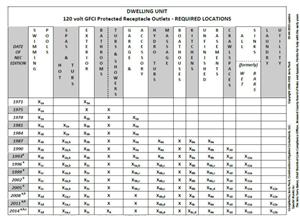
gkenyon:ProMbrooke:Would these be for mainland Europe where bathrooms may not have supplemental bonding?
I personally would not rely on bonding alone in wet locations, in particular exterior sockets where earth mat is not practical for a user.Roughly harmonized across Europe, minor differences as socket-outlets are permitted in Zone 1 etc. - RCD protection gets you to 0.04 s, so OK. A slightly more cautious approach, but there all the same.
I don't really see an issue for "wet" or "humid" as we either apply bonding, or use RCD in the UK.
Exterior locations are not classed as "wet" particularly in BS 7671. But your point is fair and definitely considered. RCD protection is used for outdoor socket-outlets and many items of outdoor equipment, so disconnection time is 0.04 s (Regulation 411.3.3). Larger circuits with Class I products, expect larger CPC and perhaps lower touch voltages ... and so on with that sort of thinking.
I'm surprised regarding exterior sockets, but this may come from the UK having a CPC since the WWII. I'd go on a limb and say the UK has not had many accidents involving outdoor equipment hence not being classed as a wet location, at least this would be my guess.
In the US where missing or no CPCs were common on metal tools, GFCIs were first required on outdoor receptacles before moving to bathrooms, garages, ect. The most injuries occured in outdoor locations.

gkenyon:ProMbrooke:Would these be for mainland Europe where bathrooms may not have supplemental bonding?
I personally would not rely on bonding alone in wet locations, in particular exterior sockets where earth mat is not practical for a user.Roughly harmonized across Europe, minor differences as socket-outlets are permitted in Zone 1 etc. - RCD protection gets you to 0.04 s, so OK. A slightly more cautious approach, but there all the same.
I don't really see an issue for "wet" or "humid" as we either apply bonding, or use RCD in the UK.
Exterior locations are not classed as "wet" particularly in BS 7671. But your point is fair and definitely considered. RCD protection is used for outdoor socket-outlets and many items of outdoor equipment, so disconnection time is 0.04 s (Regulation 411.3.3). Larger circuits with Class I products, expect larger CPC and perhaps lower touch voltages ... and so on with that sort of thinking.
I'm surprised regarding exterior sockets, but this may come from the UK having a CPC since the WWII. I'd go on a limb and say the UK has not had many accidents involving outdoor equipment hence not being classed as a wet location, at least this would be my guess.
In the US where missing or no CPCs were common on metal tools, GFCIs were first required on outdoor receptacles before moving to bathrooms, garages, ect. The most injuries occured in outdoor locations.
We're about to take you to the IET registration website. Don't worry though, you'll be sent straight back to the community after completing the registration.
Continue to the IET registration site